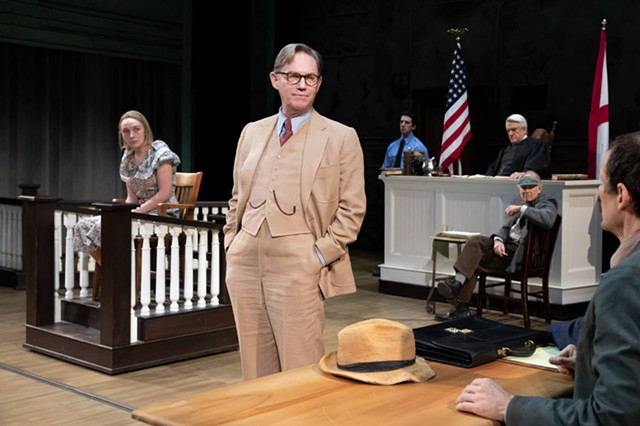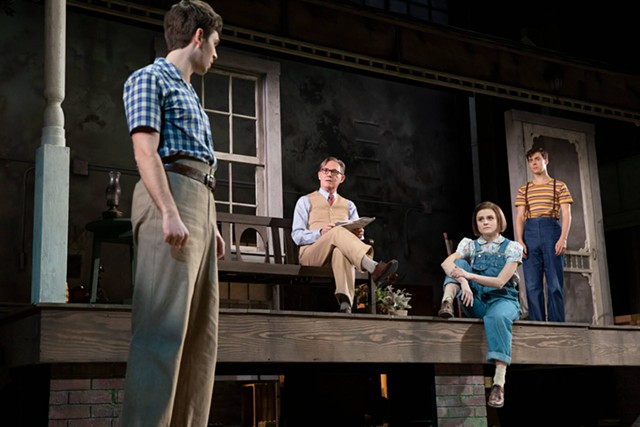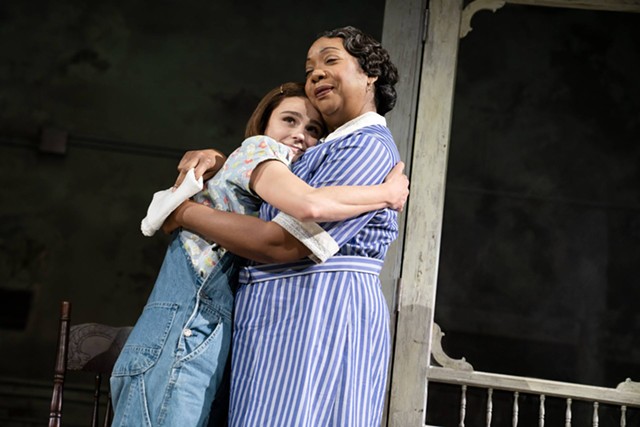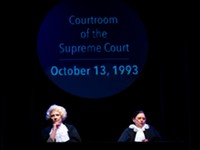[
{
"name": "500x250 Ad",
"insertPoint": "5",
"component": "15667920",
"parentWrapperClass": "",
"requiredCountToDisplay": "1"
}
]
There are three things about the powerful touring Broadway production of “To Kill a Mockingbird,” which opened Tuesday at the Auditorium Theatre and plays through Sunday, that will be apparent to audiences who grew up treasuring the book or the film.
The first is that the play isn’t anything like Harper Lee’s 1960 Pulitzer Prize-winning novel they read in high school.
Of course, it is still the story of genteel, widowed lawyer Atticus Finch standing up to racism by bravely but unsuccessfully defending Tom Robinson, an innocent Black man accused of raping a white woman in small-town Alabama during the Great Depression.
But the leisurely pace of Lee’s narrative that recalled languorous childhood summers squashing redbugs has gone the way of those insects. While it took Lee 17 chapters to lure readers into the courtroom, the stage adaptation does it in five minutes.
The second is that the play isn’t anything like the 1962 Oscar-winning film starring Gregory Peck as Atticus, either.
This Atticus, played soulfully by Richard Thomas, lacks the lanky grace and craggy good looks that allowed Finch to tower over townspeople like a paragon of virtue on screen. Thomas, who is best known to older audiences as John-Boy Walton from “The Waltons” and to younger people as the God-fearing grandfather from “Ozark,” has an everyman quality about him that conveys an Atticus who is human and flawed.
The last thing audiences will realize is that they are enjoying the play as much as — or in some cases more than — either the novel or the movie.
That’s because while the stage adaptation hews to the major characters and plot twists, it has been updated in ways both conspicuous and subtle to make the now familiar storyline more compelling to the modern audience.
Much of that stems from the whip-smart, lightning-fast dialogue and dramatic changes in structure ginned up by playwright Aaron Sorkin, of “The West Wing” and “A Few Good Men” fame.
While the novel possesses plenty of good-natured humor, Sorkin’s play is punctuated by belly laughs, sometimes strings of them. They even delightfully creep up during pivotal scenes, somehow without tamping down the tension.
But what makes this stage adaptation even more resonant is the strength Sorkin gives to characters who were simplified in earlier versions of the story. In the play, they act as Atticus’s conscience by questioning him and, sometimes, needling him.
The result is an Atticus who undergoes a transformation on stage in a way he never does in the novel or film, where he is the most decent and honest person in town from start to finish.
While the old Atticus calmly endures spit in his face and threats from Bob Ewell (Joey Collins), the father of the girl allegedly abused by Tom, the new Atticus gets him in a chokehold and threatens to break his arm, although he later rues his impetuousness and apologizes.
Lee told the story from the perspective of Finch's daughter, Scout. Sorkin splits the narrative between Scout (Melanie Moore), her brother, Jem (Justin Mark), and their friend, Dill Harris (Steven Lee Johnson).
The effect allows the audience to evaluate Atticus through three sets of eyes, at least one of which are not wearing rose-colored glasses.
Jem, for instance, calls his father “meek” and condemns his obsequiousness toward their racist neighbors by saying, “Being polite is no way to win a war.”
But the most notable growth is reserved for the Black characters.
Yaegel T. Welch shines as Tom, whose life and dignity are on trial. It is he, not Scout (as in the novel), who speaks to the racial inequity that has ensnared him by saying, “I’s guilty soon as I was accused.”
Calpurnia, the Finches’ loving housekeeper played by Jacqueline Williams with affection and bite, confronts Atticus on his privilege.
When Atticus explains his deference toward even the most rabid racists by saying he believes in treating everyone with respect, Calpurnia fires back, “No matter who you’re disrespecting by doing it.” When he tells her that their town of Maycomb needs time to overcome racism, she asks, “How much time would Maycomb like?”
And when the Finch household gets word that Tom has been killed by prison guards while ostensibly trying to escape, it is Calpurnia who wonders aloud how a one-armed man could climb a prison yard fence and questions how many times they shot him.
Comments and questions like that leave plenty of room for audiences to ruminate on the racial injustices that persist in America today.
In the years leading up to the publication of the novel, Rosa Parks had refused to give up her seat on an Alabama bus; Black students staged a sit-in at a Woolworth lunch counter in North Carolina; the Little Rock Nine were barred from an Arkansas high school; and Emmett Till was murdered after being accused of offending a white woman.
Sorkin wrote the play in 2018, following the shooting deaths of Black teenagers Trayvon Martin in Florida and Michael Brown in Missouri.
But the play reverberates even more in the aftermath of the deaths of George Floyd and Daniel Prude and the rise of the Black Lives Matter movement in 2020, all of which led to the racial and social justice reckoning the country is currently undergoing.
In his summation to the jury, Atticus turns to the audience, as if speaking to the house.
“We can’t go on like this, we know,” he says. “We have to heal this wound or we will never stop the bleeding.”
It’s enough to make the audience ponder with trepidation whether a remake of this classic in another 60 years will resonate as much.
“To Kill a Mockingbird” was brought to Rochester by the Rochester Broadway Theatre League and plays through June 18. Run time: 2 hours, 35 minutes.
Tickets range from $45 to $110, depending on seating and performance times.
David Andreatta can be reached at [email protected].
The first is that the play isn’t anything like Harper Lee’s 1960 Pulitzer Prize-winning novel they read in high school.
Of course, it is still the story of genteel, widowed lawyer Atticus Finch standing up to racism by bravely but unsuccessfully defending Tom Robinson, an innocent Black man accused of raping a white woman in small-town Alabama during the Great Depression.
But the leisurely pace of Lee’s narrative that recalled languorous childhood summers squashing redbugs has gone the way of those insects. While it took Lee 17 chapters to lure readers into the courtroom, the stage adaptation does it in five minutes.
The second is that the play isn’t anything like the 1962 Oscar-winning film starring Gregory Peck as Atticus, either.
This Atticus, played soulfully by Richard Thomas, lacks the lanky grace and craggy good looks that allowed Finch to tower over townspeople like a paragon of virtue on screen. Thomas, who is best known to older audiences as John-Boy Walton from “The Waltons” and to younger people as the God-fearing grandfather from “Ozark,” has an everyman quality about him that conveys an Atticus who is human and flawed.
The last thing audiences will realize is that they are enjoying the play as much as — or in some cases more than — either the novel or the movie.
That’s because while the stage adaptation hews to the major characters and plot twists, it has been updated in ways both conspicuous and subtle to make the now familiar storyline more compelling to the modern audience.
Much of that stems from the whip-smart, lightning-fast dialogue and dramatic changes in structure ginned up by playwright Aaron Sorkin, of “The West Wing” and “A Few Good Men” fame.
While the novel possesses plenty of good-natured humor, Sorkin’s play is punctuated by belly laughs, sometimes strings of them. They even delightfully creep up during pivotal scenes, somehow without tamping down the tension.
But what makes this stage adaptation even more resonant is the strength Sorkin gives to characters who were simplified in earlier versions of the story. In the play, they act as Atticus’s conscience by questioning him and, sometimes, needling him.
The result is an Atticus who undergoes a transformation on stage in a way he never does in the novel or film, where he is the most decent and honest person in town from start to finish.
While the old Atticus calmly endures spit in his face and threats from Bob Ewell (Joey Collins), the father of the girl allegedly abused by Tom, the new Atticus gets him in a chokehold and threatens to break his arm, although he later rues his impetuousness and apologizes.
Lee told the story from the perspective of Finch's daughter, Scout. Sorkin splits the narrative between Scout (Melanie Moore), her brother, Jem (Justin Mark), and their friend, Dill Harris (Steven Lee Johnson).
The effect allows the audience to evaluate Atticus through three sets of eyes, at least one of which are not wearing rose-colored glasses.
Jem, for instance, calls his father “meek” and condemns his obsequiousness toward their racist neighbors by saying, “Being polite is no way to win a war.”
But the most notable growth is reserved for the Black characters.
Yaegel T. Welch shines as Tom, whose life and dignity are on trial. It is he, not Scout (as in the novel), who speaks to the racial inequity that has ensnared him by saying, “I’s guilty soon as I was accused.”
Calpurnia, the Finches’ loving housekeeper played by Jacqueline Williams with affection and bite, confronts Atticus on his privilege.
When Atticus explains his deference toward even the most rabid racists by saying he believes in treating everyone with respect, Calpurnia fires back, “No matter who you’re disrespecting by doing it.” When he tells her that their town of Maycomb needs time to overcome racism, she asks, “How much time would Maycomb like?”
And when the Finch household gets word that Tom has been killed by prison guards while ostensibly trying to escape, it is Calpurnia who wonders aloud how a one-armed man could climb a prison yard fence and questions how many times they shot him.
Comments and questions like that leave plenty of room for audiences to ruminate on the racial injustices that persist in America today.
In the years leading up to the publication of the novel, Rosa Parks had refused to give up her seat on an Alabama bus; Black students staged a sit-in at a Woolworth lunch counter in North Carolina; the Little Rock Nine were barred from an Arkansas high school; and Emmett Till was murdered after being accused of offending a white woman.
Sorkin wrote the play in 2018, following the shooting deaths of Black teenagers Trayvon Martin in Florida and Michael Brown in Missouri.
But the play reverberates even more in the aftermath of the deaths of George Floyd and Daniel Prude and the rise of the Black Lives Matter movement in 2020, all of which led to the racial and social justice reckoning the country is currently undergoing.
In his summation to the jury, Atticus turns to the audience, as if speaking to the house.
“We can’t go on like this, we know,” he says. “We have to heal this wound or we will never stop the bleeding.”
It’s enough to make the audience ponder with trepidation whether a remake of this classic in another 60 years will resonate as much.
“To Kill a Mockingbird” was brought to Rochester by the Rochester Broadway Theatre League and plays through June 18. Run time: 2 hours, 35 minutes.
Tickets range from $45 to $110, depending on seating and performance times.
David Andreatta can be reached at [email protected].












